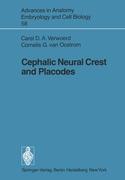- Start
- Cephalic Neural Crest and Placodes
Cephalic Neural Crest and Placodes
Angebote / Angebote:
In 3-4 week human embryos, the ectoderm covering the head shows considerable re gional differences in both structure and thickness. The temporary appearance of circumscribed areas of relatively thick ectoderm has been observed in embryos of a variety of vertebrates. These areas, discovered by Van Wijhe (1882) in fish embryos, were called placodes by Von Kupffer (1894). These placodes have been studied extensively in embryos of lower vertebrates, probably be cause they can be clearly distinguished in these animals and are readily accessible for experiments. Areas of thick ectoderm in human embryos, first described by Bartelmez and Evans (1926), cover nearly the entire lateral side of the primordium of the head, but do not seem to be identical with the above-mentioned placodes. In human embryos, and in mammalian embryos in general, the placodes are probably part of these larger regions of thick ectoderm. Only incomplete and contradictory data are to be found in the literature on both the origin and development of the areas of thin and thick ectoderm. The relationship between placodes and the larger regions of thick ectoderm has scar cely been studied. In the research described here, some aspects of the problem of the initial develop ment of the ectoderm of the head were studied more closely. In addition, attention was also paid to the general morphology of the young mouse embryo to supplement a previous study (Snell, 1941).
Folgt in ca. 5 Arbeitstagen




